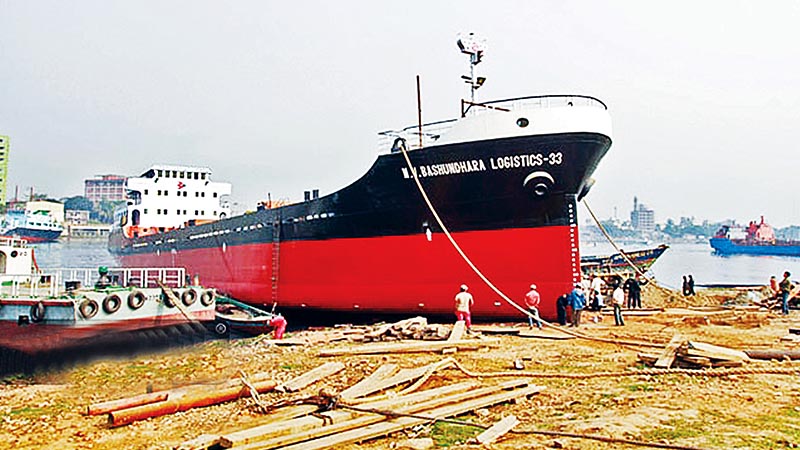Shipyards encroach Buriganga
Relocation underway

More than 30 small and large shipyards have evolved on the banks of River Buriganga without having clearance from authorities concerned. Except for only a handful of the shipyards none possess legal documents to operate as legitimate ship building organization. Most of the shipyards are built on encroached land by local powerful businessmen who claim the land by the riverside is owned by respective shipyard owners but during recent official surveys none, except for a very few, could produce legal land ownership documents.
Such business to build passenger and goods carrying ships are going on for decades defying environment and river conservation rules. Due to such business on the banks the river has already become narrower almost choking the river at Keraniganj –Sadarghat point affecting daily docking of hundreds of passenger vessels at Sadarghat, the biggest river transport terminal of the country.
Even worse, the workshops in the shipyards occupying about ten – fifteen kilometer stretch of the river banks release hundreds of tons of toxic chemicals, used diesel and lubricants while repairing the river vessels. Water samples from various points near the shipyards have already revealed the dangerous levels of chemical toxicity amid repeated demands to prevent the river pollution.
Environmentalists warn that if the government fails to take immediate measures to stop such environmental damages, aquatic life in the river would be completely lost which could be a big blow to such a vital river considered ‘lifeline of Dhaka’. When contacted, Dr Muzibur Rahman Howlader, Chairman of National River Conservation Commission (NRCC) told Bangladesh Post, “To bring discipline in the ship building industry in Keraniganj we formed a committee to identify their legitimate business.
Out of a total of 33 shipyards we found that 30 could not produce legal documents required to operate as shipyard. Most of them do not possess land ownership documents and none could show ‘No Objection Certificate’ (NOC) from the Ministry of Environment, Forest and Climate Change.” Howlader termed the situation as grave saying, “We tried to find real land owners of the shipyards called ‘Record of Rights’ but sadly except three the rest could not show any legal documents which means they have encroached the river banks to carry out business illegally.”
Howlader, however, was optimistic about relocating the shipyards. He said that a committee has been working involving all stakeholders to find ‘suitable’ land by the river to relocate the ship builders from Keraniganj and find permanent solution. “The government is ready to pay compensation to the shipyard owners if necessary but all shipyards have to be relocated. The district commissioner of Dhaka would soon suggest potential land which can be used for the purpose,” Howlader said.
Haji Nazmul Hoque, President of Dhaka Ship Builders Group denied the allegations claiming that the shipyard owners possess legal documents to carry out business. “We have been doing shipbuilding and repairing business in the areas having legal papers,” Hoque told Bangladesh Post. He said, “We have registration and NOC from the Bangladesh Inland Water Transport Authority (BIWTA). We have been paying tax, VAT and pre-survey fees against all the shipyards located in the areas for a long time.
We have not violated any rules as most of the shipyards are operated on land owned by local people.” Hoque, however, admitted that the shipyards defy environment ministry rules. Asked to comment on the river pollution issue, he said, “None of the shipyards possess NOC from the Ministry of Environment, Forest and Climate Change.”
He also agreed that a relocation initiative would come to a great benefit of the ship builders. Sharif Jamil, Joint Secretary of Bangladesh Paribesh Andolon or BAPA told Bangladesh Post that the shipyards threatens the very existence of the river itself. “More damage is done by the shipyards than the sewerage line pollutions. They are encroaching the river on one hand while polluting the river on the other.” The shipyard business is worth an estimated Tk 200 crore annually. The shipyards together build about 30 passenger and 20 goods carrying ships every year for the domestic market.



